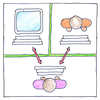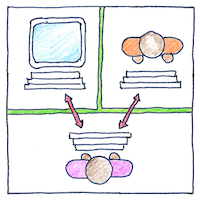Alan Turing
philosophy of science

|
Turing test
A universal Turing machine can simulate any other digital machine but could it simulate a human being’s thinking and consciousness? Turing reduced this to a less ambiguous question. Could a machine do what we as humans do? Could a machine hold a dialog with a human so as to be indistinguishable from another human? He said, yes, there’s no reason it couldn’t, and he proposed a simple test.
Nine objections
We are not trying to make machines with souls, but to make mansions for the souls that God has made. Even if machines shouldn’t make humans feel inferior and humans wouldn’t like it, it could happen. Even though there are limits to logic, humans are also limited. Even though there are mysteries to consciousness we don’t need to solve them to create a thinking machine. We can make a machine behave any way we like, be self-aware, have a wide range of behaviors, or make mistakes. Even if a machine may do only what it is programmed to do, it can still be programmed to surprise and delight. With enough computing power, digital machines can imitate human analog systems. Although it seems that human behavior obeys no rules, machines may follow rules equally subtle and complex. Even if human beings have extra-sensory perceptions, they can leave that at the door and still behave with intelligence.
Thinking
A poem can be made to appear to think with the benefit of a pair of dice and a set of human- like responses. “Some may say so; others may disagree.” “I wish you’d tell me what you expect.” “I’m not telling you how to run your life.” “Examine yourself; you’re no Einstein.” “Can I get back to you on that?” “The answer is 42.” Toss those dice. If you don’t do it, someone else will. Ha, ha. Oddly, it’s not that hard. I mean other things are harder.



In his paper “Computing Machinery and Intelligence,” Alan Turing answered nine objects to his assertion that computers could some day imitate humans.
Computer intelligence does not require the ability to piss, spit, or dance en pointe. Biological creatures have their own blessings and curses that machines will not need to reproduce.
See also in The book of science:
Readings in wikipedia: